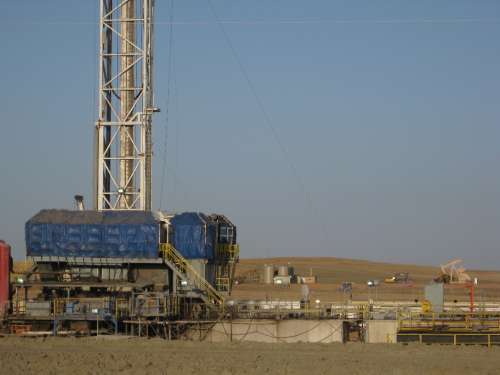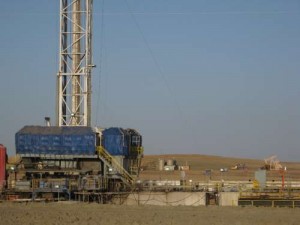
The Tight Oil Boom

Bakken oil rig. (Photo: USGS)
The shale revolution that led to a surge in natural gas production in the last few years is doing the same for oil, according to panelists at a Washington conference on June 12. The Bipartisan Policy Center (BPC) hosted a half-day conference on “The Geopolitical Impacts of the U.S. Tight Oil Boom,” which featured discussion from Senator Lisa Murkowski, and energy experts such as Daniel Yergin and Edward Morse.
Senator Murkowski kicked off the talks with a speech supporting the continued expansion of the tight oil boom in the U.S., noting that in 2011 unconventional oil and gas allowed the U.S. to become a net exporter of petroleum products for the first time since 1949. She argued that to the extent the U.S. can continue to increase tight oil production it can undermine the influence OPEC controls over energy markets.
Citibank’s Edward Morse outlined three big risks that could slow down or derail tight oil production. First, a major environmental catastrophe could trigger a backlash against the industry. Second, the long-term geology of many tight oil fields is unknown, and there is a possibility that the productivity of many wells could decline quicker than expected. This would result in lower output over the long-term. Third, price volatility could make certain projects uneconomical. If oil prices decline precipitously, the tight oil boom could go bust.
Carlos Pascual, the Special Envoy and Coordinator for International Energy Affairs at the State Department, spoke about how “self-sufficiency” should not cause the U.S. to retreat from global affairs. He cautioned against isolationism merely because the U.S. could soon produce as much oil as it consumes. He argued that oil – and increasingly natural gas – is a global market, so American consumers will be vulnerable to price volatility even if it became self-sufficient in energy. He also argued that global spare capacity remains pretty thin, and supply disruptions could send prices skyrocketing. Moreover, supply and demand over the coming years will be determined by non-OECD countries, particularly China and India.
Overall, the speakers were all generally sanguine about the direction of U.S. oil production and had little to say about climate change. This was particularly unsatisfying. It seems difficult to reconcile cheerleading the unchecked expansion of oil production around the world while still ostensibly trying to reduce greenhouse gas emissions. After all, if oil production and consumption continues to climb around the world, hitting climate targets become increasingly difficult, if not impossible, to achieve.






[…] The Tight Oil Boom […]
[…] of its ongoing series on unconventional oil and gas developments in the U.S. The first was on the geopolitical implications of the tight oil boom, and this second event covered the geopolitical implications of the surge in U.S. shale gas […]